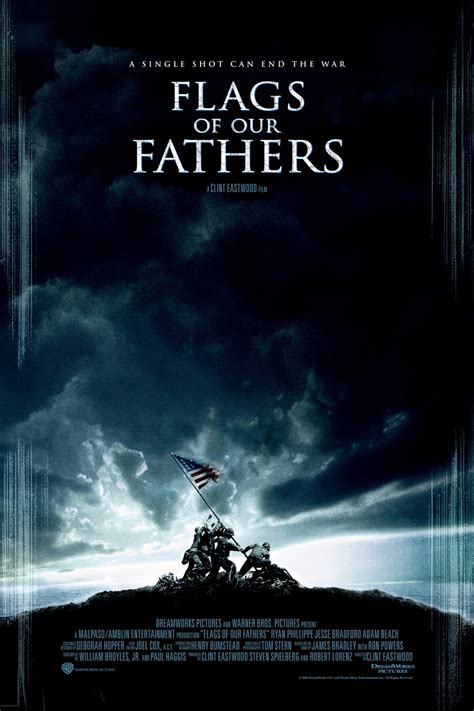Flags of Our Fathers

Description:
Flags of Our Fathers is a war film that tells the story of the six men who raised the American flag at the Battle of Iwo Jima during World War II. The film explores the complexities of heroism and the impact of war on those who fight in it.Keywords:
Heroism, War, Memory, Sacrifice, IdentityIs the movie Flags of Our Fathers a true story?
Yes, "Flags of Our Fathers" is based on true events. The film, directed by Clint Eastwood and released in 2006, tells the story of the six U.S. Marines who raised the American flag on Iwo Jima during World War II, an iconic moment captured in a famous photograph. The movie explores the lives of the soldiers, particularly focusing on the experiences of three of them—John Bradley, Rene Gagnon, and Ira Hayes—highlighting the complexities of heroism and the impact of war on their lives after the battle.
Is Flags of Our Fathers a good movie?
"Flags of Our Fathers," directed by Clint Eastwood, is generally regarded as a good movie. It offers a powerful portrayal of the Battle of Iwo Jima and the complexities of heroism and war. The film is based on the true story of the six men who raised the American flag on Mount Suribachi and explores themes of sacrifice, memory, and the impact of war on soldiers. Critics praised its cinematography, performances, and depth, though some viewers found its pacing slow. Overall, it is considered a significant war film with emotional weight.
Was Clint Eastwood's son in Flags of Our Fathers?
Yes, Clint Eastwood's son, Scott Eastwood, appears in "Flags of Our Fathers." He plays the role of Navy corpsman John "Doc" Bradley in the film, which was directed by Clint Eastwood and released in 2006. The movie focuses on the Battle of Iwo Jima and the iconic flag-raising photograph taken during the battle. Scott's performance was part of a cast that included notable actors like Ryan Phillippe and Jesse Bradford.
What was the controversy of Flags of Our Fathers?
"Flags of Our Fathers," directed by Clint Eastwood, faced controversy primarily regarding its portrayal of the iconic photograph of the Iwo Jima flag-raising. Some critics argued that the film oversimplified the complexities of war and the experiences of the soldiers involved. Additionally, the film's focus on the lives of the flag-raisers, particularly the way it depicted their struggles with fame and trauma, sparked discussions about the ethics of representing real-life figures in a dramatized narrative. This dual focus on heroism and the darker aspects of war generated mixed reactions.
Explore More Categories:
Masculinity Cosmic Hypnosis Netflix Film Environment Sexual Harassment Catastrophe Minimalist Youth Human Experience Submarine Japanese Cinema Civil Rights War Drama Globalization Social Issue Odyssey Small Town Life Psychological Thriller Diversity Choices Humiliation Peculiarities Domestic Tension Childhood